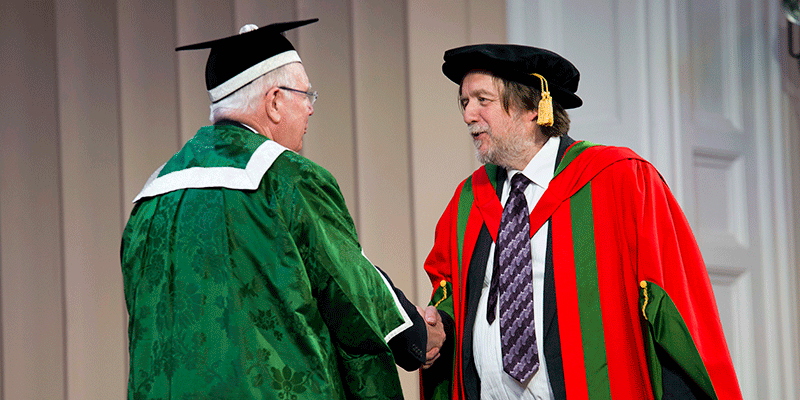John Hardy

Presentation address by Professor Anthony Turner
Vice-Chancellor,
It is estimated that one million people in the UK will have dementia by 2025, and two million by 2050. That is a huge challenge for society, and today we honour a scientist who is at the forefront of efforts to transform our knowledge of the diseases involved, and to advance research into future treatments.
John Hardy graduated from Leeds in 1976, with a BSc in Biochemistry, and, spurning his original career plan to be a long-distance lorry driver, undertook a PhD in neuroscience at the University of London. After post-doctoral research in Newcastle and Sweden, he returned to London where, in 1991, his team at St Mary’s identified the first genetic mutations shown to cause Alzheimer’s disease. This led him to formulate the amyloid hypothesis of the disease, fundamental to most therapeutic strategies and developments in research in the field even since. As he has said himself, ‘We knew, when we identified the first disease-causing mutations, that our lives would be changed forever, and so it has proved’.
Using innovative genetic analysis methods, John has gone on to make major contributions to the study of many significant major neurodegenerative diseases, including Parkinson’s disease. He has published over 850 scientific papers, and his work has underpinned basic science and treatment research into Alzheimer’s over the last 25 years.
John was tempted back to the UK from the USA ten years ago by University College London where he is Head of the Department of Molecular Neuroscience and Chair of Molecular Biology of Neurological Disease at the Institute of Neurology. In recognition of his exceptional contributions to science and medicine, he was elected a
Fellow of the Academy of Medical Sciences in 2008 and a Fellow of the Royal Society in 2009; and, in 2016, was the first UK recipient of the highly prestigious Breakthrough Prize in Life Sciences, the so-called Oscars of Science, for his ‘pioneering research into the genetic causes of Alzheimer’s disease, other forms of dementia and Parkinson’s disease’. In a lighter vein, at the 2003 Society for Neuroscience meeting he was elected the worst-dressed scientist in the field – something that is difficult to credit today!
Always open to collaboration, John has been the driving force behind numerous major international studies. He is an excellent communicator, to scientists and lay persons, young and old alike, and, as a research leader, has been enormously influential in training the next generation.
John is thus a model scientist, tackling problems that matter, and inspiring others to emulate his example.
Vice-Chancellor, I am delighted to present to you for the degree of Doctor of Science, honoris causa, John Hardy.